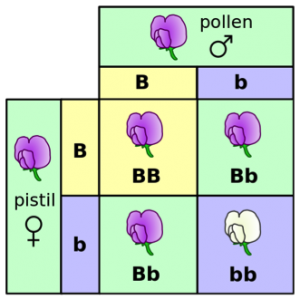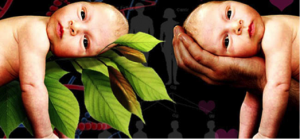By Mike Pablo
It’s well-known that children can inherit features from their parents. Eye color, hair color, and height are just some characteristics that can be passed down from parent to child. If you’ve had a class on DNA, you’ve likely heard about Mendelian inheritance, originally proposed in 1865 by Gregor Johann Mendel. Mendelian inheritance is more recognizable in the form of Punnett squares, which allow you to illustrate the possibilities of how parental traits are passed down to a child. Although the word ‘gene’ wasn’t used at the time, Mendel discovered that organisms could have alternative versions of genes. These are now called alleles. For each gene, a parent can pass down a corresponding allele to their offspring. Alleles can be dominant or recessive: dominant alleles “win” over recessive alleles, so that a trait passed down by a dominant allele is the observed trait. The recessive allele, which “loses”, becomes hidden. If you’ve heard the term “genetic carrier“, it refers to an organism that has a recessive allele for a trait, but doesn’t show it: they are just carrying it.

Hidden traits: both the male plant and the female plant have a dominant allele B, which makes their offspring purple, and a recessive allele b which makes their offspring white. You could think of both parents as genetic carriers for white coloration. From Wikimedia Commons (credit: Madeleine Price Ball)
Mendelian inheritance – really, genetic inheritance in general – raises an important question: are we purely the product of our parent’s DNA? Is everything we do and are capable of coded within us at birth? This is a basic question of the nature vs. nurture debate: is our genetic makeup more important in defining who we are, or is it how we were raised? Take a moment to think to yourself: what do you think is more important?

Nature vs. nurture: characteristics you’re born with versus characteristics you learn?
From “Psychology Flipped!”
I don’t have a yes-or-no answer for you. I can tell you that humans have learned a lot about genetics over the past 150 years or so. A major breakthrough in the nature vs. nurture debate was the discovery of epigenetics. Epigenetics is the study of potentially heritable changes in your genetic expression, that don’t involve changes to the actual DNA sequence. If you imagine the genes in your DNA as words in a book, you can think of genetic expression as the parts a person might read; the story your DNA would tell. If you covered some words with your hand, the words are still there – but the reader can’t see them. This is roughly how epigenetics works: your DNA is still there, but epigenetic factors modify what parts of it are expressed. Differential expression of genes is why everyone has different types of cells (skin cell, muscle cell, brain cell, etc.) in their body, even though all cells all have the same DNA.
Through epigenetics, your environment and actions throughout your life can have an impact on what your DNA is instructing your cells to do, even if those actions and environmental factors don’t change your DNA sequence. Epigenetic factors can alter the expression of the DNA that you’ve inherited, so that the “nurture” you receive impacts the “nature” you inherit. In some cases, the epigenetic marks left behind can be inheritable, and so could be passed down to your children. But epigenetics doesn’t mark your DNA in a way that exactly corresponds to all your experiences: for example, people who lose limbs through amputation can go on to have children that don’t inherit the loss of limb.
The “nurture” aspect of the debate has also been looked at from an epigenetic angle in research labs. One famous experiment, which has been discussed years later, suggested that the ability of rats to cope with stress was dependent on an epigenetic change. The trigger? The amount of grooming provided by their mother when they were babies. They also found that the stress resistance wasn’t passed down to a third generation of rats, so the epigenetic change was limited to a single generation – like I said, it’s important to recognize that even if epigenetic changes happen, not every epigenetic change is inherited. Can you imagine how weird that would be: if people could be born with all the experiences of their parents?
Edited by Anna Chiarella and Kelsey Gray
